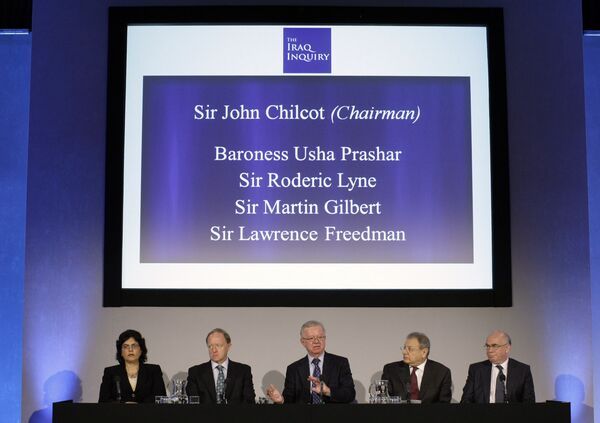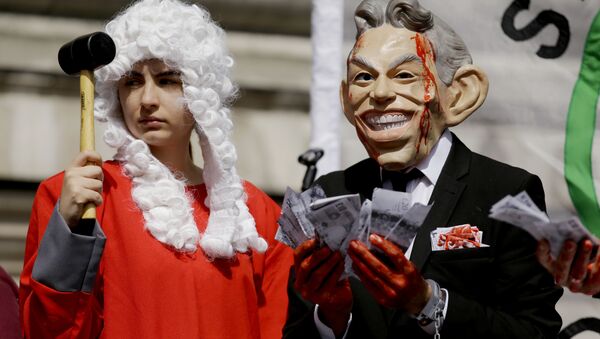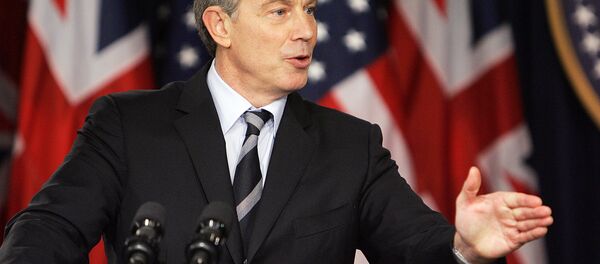The Chilcot report into why Britain went to war against Saddam Hussein is critical of Blair's decision to join the US-led invasion to topple Hussein. Blair faced accusations of lying to parliament over an alleged private agreement — without parliamentary approval — to join the invasion, which was based on flawed intelligence on Iraq's weapons of mass destruction.
In the face of massive opposition to the war, Blair famously told The Guardian newspaper: "I've never claimed to have a monopoly of wisdom, but one thing I've learned in this job is you should always try to do the right thing, not the easy thing. Let the day-to-day judgments come and go: be prepared to be judged by history."
To be a success, #Chilcot reports must answer 1 major question. What should the UK have done re: #Iraq and how? No easy answers.
— Chris Doyle (@Doylech) July 5, 2016
Chris Doyle, a commentator on the Middle East and Director of the Council for Arab-British Understanding told Sputnik: "Tony Blair will have a checkered record and I think history will remember him, firstly, as the prime minister who won three successive elections, but a prime minister who was massively tarnished by Iraq, the horror of what's happened from 2003 up to now and ongoing. That will certainly be, as it were, on his tombstone.
"In recent times, his reputation has been somewhat sullied by all the business dealings that he's had, often with dictatorial regimes. For a man whose most famous action was to bring the end to one dictatorial regime, he has been so willing to work with and for other after leaving office," Doyle said.
War Crime?
Blair is now facing calls for impeachment over his deal with George W Bush and his use of flawed intelligence to make the case for war. However, the International Criminal Court (ICC) has said that, although it will consider the Chilcot report, "the specific question of the legality of the decision to resort to the use of force in Iraq in 2003 — or elsewhere — does not fall within the legal mandate of the Court, and hence, is not within the scope of its preliminary examination."

Doyle told Sputnik: "The chances of Tony Blair lining up in front of a war crimes tribunal are extremely limited. We have seen that the International Criminal Court has said that it has no jurisdiction to put Tony Blair on trial.
Protesters chanting ‘Bush and Blair – murderers’ #IraqTruthAndJustice #ChilcotReport https://t.co/6bwg6wwgKi pic.twitter.com/R7GhG6qo5E
— Sputnik UK (@SputnikNewsUK) July 6, 2016
"But this will go to the heart of the reaction to the Chilcot inquiry, because one half of the population have made up their minds and believe that he should be put on trial and should be made accountable for what he did, and the other who say he did the right thing — yes, there may have been mistakes in planning, but ultimately he did no wrong.
"Quite frankly, I don't see how the Chilcot report is going to shift the opinions people have of Tony Blair. The role is this inquiry to outline some of the lessons that we need to learn from Britain's devastating foreign policy decision since Suez, or maybe even before, and that is absolutely vital. I doubt it will settle — nor was it the aim of this inquiry — the issue of whether Tony Blair will or even should stand trial."
"He was aware that he may not help the debate. But he is still popular in the United States and other countries, so I think that Tony Blair will continue pretty much business as usual. Will his brand be somewhat damaged? To an extent, but I think most of the damage that has been done has already happened," Doyle told Sputnik.



